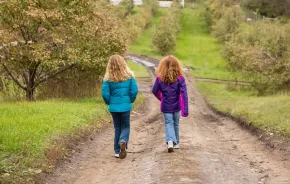 By Maria Bellos Fisher
By Maria Bellos Fisher
“Bye-bye!” I said, waving at my toddler.
“Ba! Ba! Ba!” he said, waving back.
Finally! I’ve been waiting for this kid to talk for 17 months. Well, really more like eight months, since his sister talked at nine months. She truly was, and is, a prodigy. They have the same genes — seriously, they look exactly alike. Why wouldn’t I expect her brother to be just like her?
My problem is that I did expect him to talk early, and walk early, and do all the things his sister did, when she did them. But he didn’t. She not only talked, she walked, at nine months. (It was a very productive month.) He didn’t walk until his first birthday. That was fine. When your first child learns to walk, you’re overcome with pride and joy, and then, when their destructive capabilities explode, you wonder why you ever wanted them to walk in the first place. So the walking thing was cool. I could have gone a few more months without him walking. Truth be told, the only reason I want my son to develop physically is so he can defend himself against his sister’s attacks.
But talking, now that was a different story. Once my daughter started to talk, she was able to tell us what she wanted, what she didn’t want, what hurt, and countless other things more efficiently than before. Once she started talking, she collected words like Hummels collect dust. She knew what she wanted and she knew how to get it. My son has developed his own methods of procurement. When he wants something, he’ll point and say, “Eh, eh, eh, eh, eh, eh” until you give in and give it to him. It’s whiny and annoying. So I tried, countless times, to tell him, “No, you’ve got to talk if you want that,” but I’d always wind up giving in to him because, frankly, I couldn’t listen to the “Eh, eh, eh” anymore.
Highly motivated, I tried lots of ways to make him talk. Parenting experts tell you to narrate everything you do, so your kid hears more words and is encouraged to speak. I never did that with my daughter, but I was willing to try anything with my son. I narrated in third person. I never even write in the third person, but for some reason, narrating your life works better that way. “Mommy’s chopping peppers. Pep-pers. Say ‘pep’ ‘ers.’ Mommy’s slicing onions. ‘ON-ions.’ Now Mommy can get the sausage out of the refrigerator. Can you say ‘fridge?’”
“Eh, eh, eh, eh,” he’d say, pointing to his bottle on the counter.
Teaching your kid sign language is supposed to pave the way for spoken language. It’s a kind of gateway speech. I tried. It is recommended that you start signing when your child is about six months old. I started signing to my son at five months. I didn’t expect anything then. Months went by. His sister signed at about eight months and once she started, she couldn’t stop. Nine months with him. Nothing. Except for a few signs, we kind of gave up.
Then, when he was eleven months old, he was in his high chair, eating, and with ten minutes of coaching, we got him to make the sign for “more.” Hallelujah! I couldn’t wait for him to make more signs. He continued to make the sign for “more,” but never without persuasion. I assured myself that getting his point across quickly and easily would lead to a language explosion, but the breakthrough failed to light the fuse.
Part of it was our fault. Why would he speak when “Eh, eh, eh,” was so effective? But the thing was it was so annoying, we couldn’t listen to it for very long without giving in. As time went on, he learned the sign for “please” — sort of. He was begging his dad for ice cream and Matt rubbed his chest and said, “Say please!” so he reached out and rubbed his dad’s chest. It was so cute we had to give it to him.
Around Thanksgiving, I insisted he said “Gobble gobble,” and he did, only it was something he wouldn’t repeat for us. It was just something he said when he was eating. Then about a month ago, I took him to the doctor to check out a rash. Our regular doc was busy so we saw another one. This guy asked me if my son said any words. I said, “Well, he kind of says 'Hiya.'” Then he told me I should discuss his lack of vocabulary with his doctor next time I see her. Then he said something about autism. Autism?
Thank god my son is my second kid or I’d have freaked out on the way out of the doctor’s office. There’s no way this kid is autistic. He’s very social and interactive and responsive to people. He just doesn’t talk. Plus, I hear all over the place that it’s perfectly normal for kids not to talk until they’re two. I didn’t stop wanting him to talk, though.
About a week after that doctor visit, my husband was leaving for work and he said, “Bye-bye” to my son, and we heard “BA! BA!” and my son waved. The kid talked! It was a morning miracle! And this was a real word, because we said “Bye-bye” about 30 more times before my husband left and my son responded in kind.
So far he only says “Ba-ba” and sometimes “Hi-ya,” which, we believe, he learned from his Cookie Monster toy. And he still points and says “Eh, eh, eh.” But now, we know that “Eh, eh, eh” will soon be “Milk, milk, milk!” or “Blocks, blocks, blocks!” Now that he says a few words, we’re more relaxed. We didn’t think anything was wrong with him before, but there was room in our conviction for doubt. Now we know he just takes his time.
And that’s the lesson we’ve learned from this frustrating language journey. No matter what we did, our son was going to talk in his time — not his sister’s, not ours. It’s two lessons, really. One, every kid is different, and two, no matter how hard you push, you can’t accelerate your kid’s development. He’s ready when he’s ready. No matter when you’re ready, and no matter how ready you are.
Did you ever push your child to speak earlier than he or she wanted, or come to the same conclusions with your own babble battle? We would love to hear about your experiences!
Maria Bellos Fisher is a freelance writer, blogger and “unfair” mother to two toddlers. Her blog, “Hereditary Insanity” is at: mariabellosfisher.com/blog.









